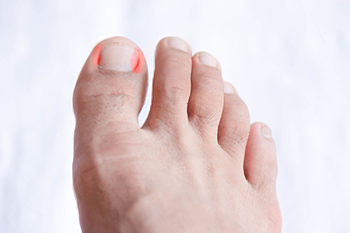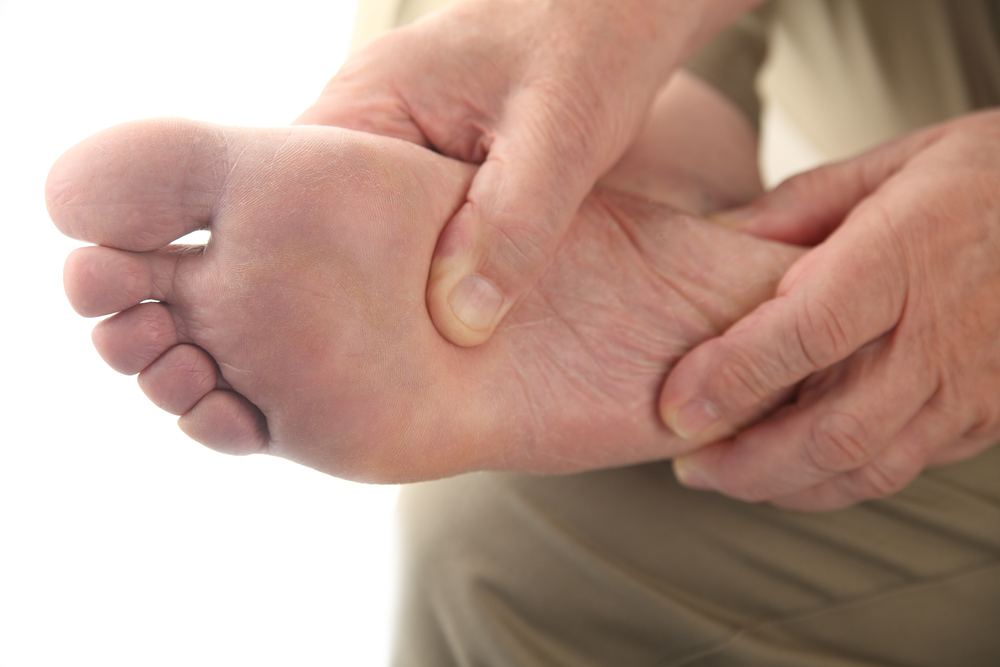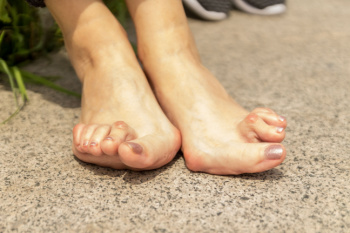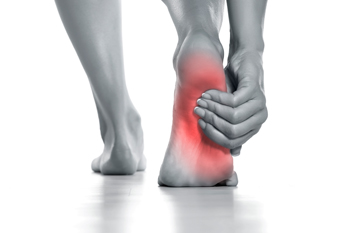Connect With Us
Blog
Items filtered by date: October 2025
Stop Your Toenail Fungus
The Symptoms of an Ingrown Toenail
 There are various reasons why patients can develop an ingrown toenail. These can include incorrectly trimming the toenails, genetic predisposition, and wearing shoes that do not fit properly. Many patients have symptoms such as redness and tenderness surrounding the ingrown toenail, and an infected toe may cause pus to drain from it. Mild relief may be found when the foot is soaked in warm water, and it may help to wear larger shoes. The feet can feel better when they are clean and dry, and it may help to apply an antibacterial ointment. If you have developed an ingrown toenail, it is suggested that you seek the counsel of a podiatrist who can properly treat this condition.
There are various reasons why patients can develop an ingrown toenail. These can include incorrectly trimming the toenails, genetic predisposition, and wearing shoes that do not fit properly. Many patients have symptoms such as redness and tenderness surrounding the ingrown toenail, and an infected toe may cause pus to drain from it. Mild relief may be found when the foot is soaked in warm water, and it may help to wear larger shoes. The feet can feel better when they are clean and dry, and it may help to apply an antibacterial ointment. If you have developed an ingrown toenail, it is suggested that you seek the counsel of a podiatrist who can properly treat this condition.
Ingrown toenails can become painful if they are not treated properly. For more information about ingrown toenails, contact Patricia Mcilrath, DPM of Health One Podiatry. Our doctor can provide the care you need to keep you pain-free and on your feet.
Ingrown Toenails
Ingrown toenails occur when a toenail grows sideways into the bed of the nail, causing pain, swelling, and possibly infection.
Causes
- Bacterial infections
- Improper nail cutting such as cutting it too short or not straight across
- Trauma to the toe, such as stubbing, which causes the nail to grow back irregularly
- Ill-fitting shoes that bunch the toes too close together
- Genetic predisposition
Prevention
Because ingrown toenails are not something found outside of shoe-wearing cultures, going barefoot as often as possible will decrease the likeliness of developing ingrown toenails. Wearing proper fitting shoes and using proper cutting techniques will also help decrease your risk of developing ingrown toenails.
Treatment
Ingrown toenails are a very treatable foot condition. In minor cases, soaking the affected area in salt or antibacterial soaps will not only help with the ingrown nail itself, but also help prevent any infections from occurring. In more severe cases, surgery is an option. In either case, speaking to your podiatrist about this condition will help you get a better understanding of specific treatment options that are right for you.
If you have any questions, please feel free to contact our offices located in Reading and Rittenhouse Square, PA . We offer the newest diagnostic and treatment technologies for all your foot care needs.
Diabetes and Its Impact on Foot Health

Diabetes can affect the feet in many ways, often starting with reduced circulation and nerve damage. Poor circulation makes it harder for blood to flow to the lower limbs, slowing the healing process of even the smallest cuts or blisters. Nerve damage, also known as neuropathy, may cause tingling, burning, or numbness in the feet, which makes it difficult to feel injuries or pressure spots. Without proper sensation, wounds may go unnoticed and become infected. Thickened skin, fungal nails, and dry skin are also more common in people with diabetes, further increasing the risk of complications. Preventive care is essential and includes daily foot inspections, wearing comfortable footwear, and regular professional checkups. If you live with diabetes and notice any changes in your feet, it is suggested that you schedule an appointment with a podiatrist for a complete evaluation and care plan.
Diabetic foot care is important in preventing foot ailments such as ulcers. If you are suffering from diabetes or have any other concerns about your feet, contact Patricia Mcilrath, DPM from Health One Podiatry. Our doctor can provide the care you need to keep you pain-free and on your feet.
Diabetic Foot Care
Diabetes affects millions of people every year. The condition can damage blood vessels in many parts of the body, especially the feet. Because of this, taking care of your feet is essential if you have diabetes, and having a podiatrist help monitor your foot health is highly recommended.
The Importance of Caring for Your Feet
- Routinely inspect your feet for bruises or sores.
- Wear socks that fit your feet comfortably.
- Wear comfortable shoes that provide adequate support.
Patients with diabetes should have their doctor monitor their blood levels, as blood sugar levels play such a huge role in diabetic care. Monitoring these levels on a regular basis is highly advised.
It is always best to inform your healthcare professional of any concerns you may have regarding your feet, especially for diabetic patients. Early treatment and routine foot examinations are keys to maintaining proper health, especially because severe complications can arise if proper treatment is not applied.
If you have any questions, please feel free to contact our offices located in Reading and Rittenhouse Square, PA . We offer the newest diagnostic and treatment technologies for all your foot care needs.
Early Rheumatoid Arthritis Symptoms in the Feet

Rheumatoid arthritis, or RA, is an autoimmune condition that causes the body to attack its own joints, leading to inflammation and damage. Early symptoms in the feet often include pain, stiffness, and swelling, especially in the toes and midfoot. Causes are linked to immune system dysfunction, and risk factors include genetics, family history, and female gender. These early signs can make walking uncomfortable and may affect daily activities, if left untreated. A podiatrist can assess joint health, recommend supportive footwear or custom orthotics, and provide exercises to maintain mobility. If you have any of the above symptoms, it is suggested that you consult a podiatrist to detect whether it is from RA and to reduce discomfort while protecting long-term foot health and function.
Because RA affects more than just your joints, including the joints in your feet and ankles, it is important to seek early diagnosis from your podiatrist if you feel like the pain in your feet might be caused by RA. For more information, contact Patricia Mcilrath, DPM of Health One Podiatry. Our doctor will assist you with all of your podiatric concerns.
What Is Rheumatoid Arthritis?
Rheumatoid Arthritis (RA) is an autoimmune disorder in which the body’s own immune system attacks the membranes surrounding the joints. Inflammation of the lining and eventually the destruction of the joint’s cartilage and bone occur, causing severe pain and immobility.
Rheumatoid Arthritis of the Feet
Although RA usually attacks multiple bones and joints throughout the entire body, almost 90 percent of cases result in pain in the foot or ankle area.
Symptoms
- Swelling and pain in the feet
- Stiffness in the feet
- Pain on the ball or sole of feet
- Joint shift and deformation
Diagnosis
Quick diagnosis of RA in the feet is important so that the podiatrist can treat the area effectively. Your doctor will ask you about your medical history, occupation, and lifestyle to determine the origin of the condition. Rheumatoid Factor tests help to determine if someone is affected by the disease.
If you have any questions, please feel free to contact our offices located in Reading and Rittenhouse Square, PA . We offer the newest diagnostic and treatment technologies for all your foot care needs.
Reasons for Nighttime Foot Pain

Foot pain may affect the toes, arches, heels, or ankles, and it often becomes more noticeable at night, when the body is at rest. Muscle fatigue from standing or walking for long periods of time, can cause cramps that worsen during sleep. Plantar fasciitis, an inflammation of the tissue that supports the arch, may lead to sharp or throbbing heel pain that persists into the night. Nerve conditions such as Morton’s neuroma or peripheral neuropathy can create burning, tingling, or stabbing pain that interrupts sleep. Circulation problems related to diabetes may also produce aching or cramping when blood flow to the feet is reduced. In some cases, sciatica can cause pain that radiates down into the feet, making nighttime discomfort worse. A podiatrist can determine the source of the foot pain and provide treatment to relieve symptoms and protect long-term foot health. If you frequently experience nighttime foot pain, it is suggested that you schedule an appointment with a podiatrist for an exam and appropriate treatment solutions.
Foot Pain
Foot pain can be extremely painful and debilitating. If you have a foot pain, consult with Patricia Mcilrath, DPM from Health One Podiatry. Our doctor will assess your condition and provide you with quality foot and ankle treatment.
Causes
Foot pain is a very broad condition that could be caused by one or more ailments. The most common include:
- Bunions
- Hammertoes
- Plantar Fasciitis
- Bone Spurs
- Corns
- Tarsal Tunnel Syndrome
- Ingrown Toenails
- Arthritis (such as Gout, Rheumatoid, and Osteoarthritis)
- Flat Feet
- Injury (from stress fractures, broken toe, foot, ankle, Achilles tendon ruptures, and sprains)
- And more
Diagnosis
To figure out the cause of foot pain, podiatrists utilize several different methods. This can range from simple visual inspections and sensation tests to X-rays and MRI scans. Prior medical history, family medical history, and any recent physical traumatic events will all be taken into consideration for a proper diagnosis.
Treatment
Treatment depends upon the cause of the foot pain. Whether it is resting, staying off the foot, or having surgery; podiatrists have a number of treatment options available for foot pain.
If you have any questions, please feel free to contact our offices located in Reading and Rittenhouse Square, PA . We offer the newest diagnostic and treatment technologies for all your foot care needs.

